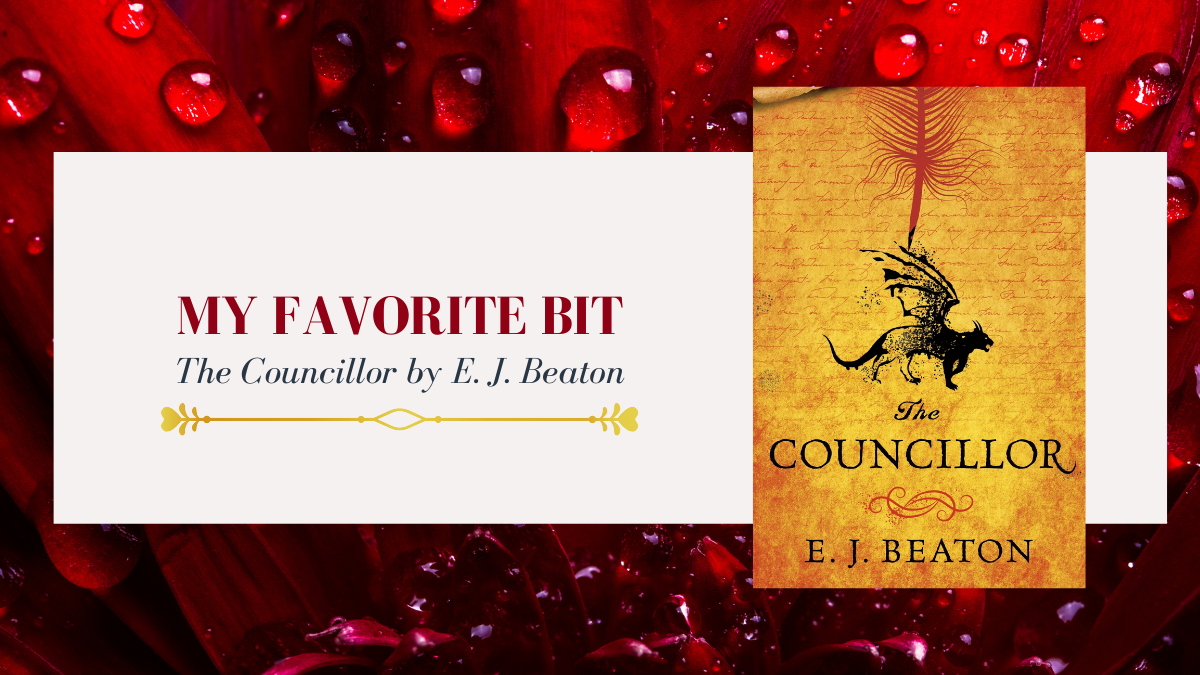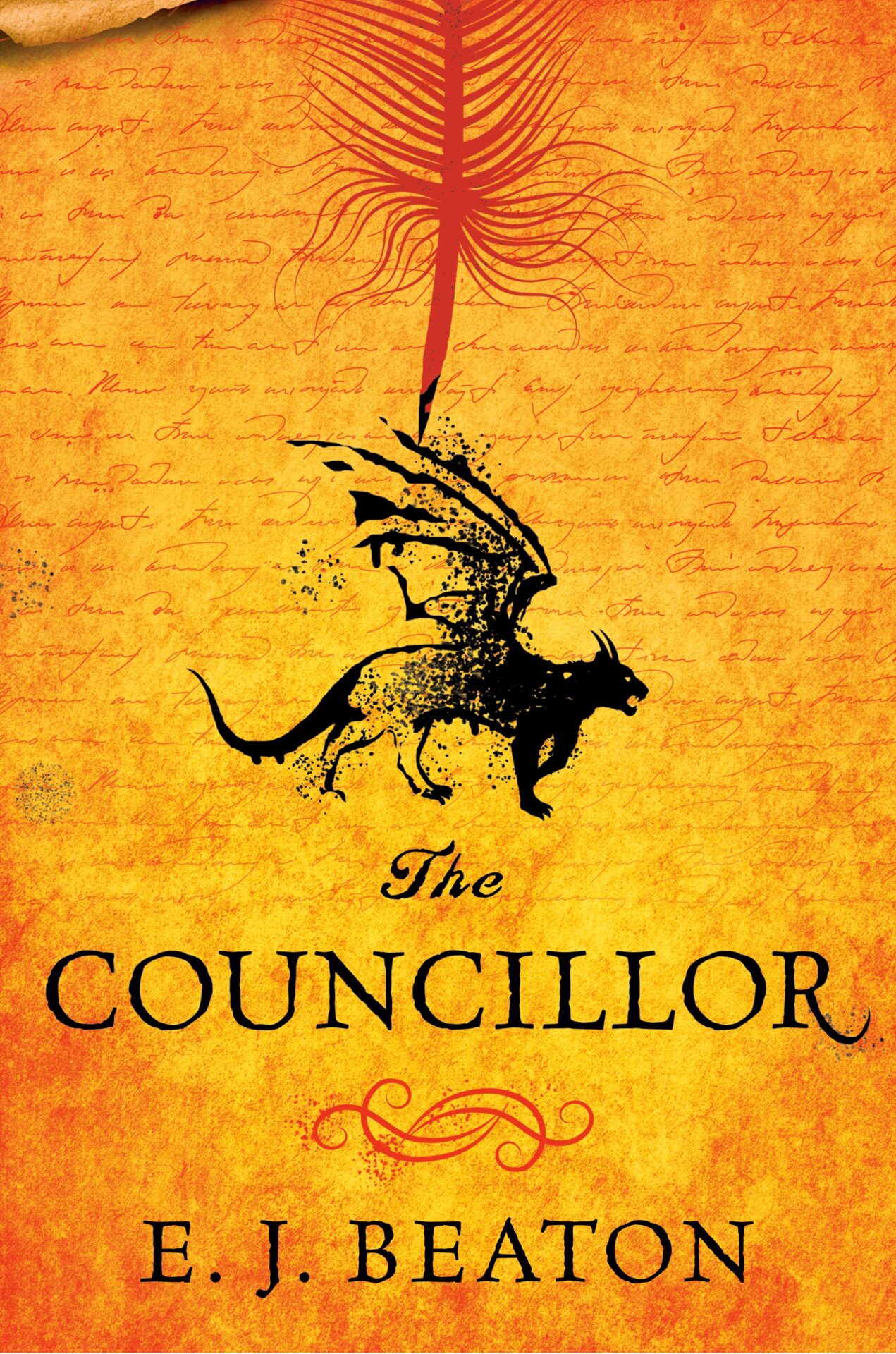
E.J. Beaton is joining us today to talk about her novel, The Councillor. Here’s the publisher’s description:
This Machiavellian fantasy follows a scholar’s quest to choose the next ruler of her nation amidst lies, conspiracy, and assassination
When the death of Iron Queen Sarelin Brey fractures the realm of Elira, Lysande Prior, the palace scholar and the queen’s closest friend, is appointed Councillor. Publically, Lysande must choose the next monarch from amongst the city-rulers vying for the throne. Privately, she seeks to discover which ruler murdered the queen, suspecting the use of magic.
Resourceful, analytical, and quiet, Lysande appears to embody the motto she was raised with: everything in its place. Yet while she hides her drug addiction from her new associates, she cannot hide her growing interest in power. She becomes locked in a game of strategy with the city-rulers – especially the erudite prince Luca Fontaine, who seems to shift between ally and rival.
Further from home, an old enemy is stirring: the magic-wielding White Queen is on the move again, and her alliance with a traitor among the royal milieu poses a danger not just to the peace of the realm, but to the survival of everything that Lysande cares about.
In a world where the low-born keep their heads down, Lysande must learn to fight an enemy who wears many guises… even as she wages her own battle between ambition and restraint.
What’s E.J.’s favorite bit?

E.J. BEATON
Have you ever felt utterly, devastatingly invisible?
I don’t mean that you’ve acquired the power to conceal your physical form, like a wizard with a magical cloak. I mean the kind of invisibility that occurs while you’re still in your body and yet your identity has been painted over. Like a fresco buried beneath the new layers of a church wall, you remain hidden – everyone can see your exterior, but no one can see who you actually are.
Many bisexual people feel this way. The international pride day for bi people is also called Bi Visibility Day, and there’s a good reason for that. To be bisexual is to be assumed to be straight (if you’re with a partner of the opposite sex), to be assumed to be gay (if you’re with a partner of the same sex), to be assumed to be an act of entertainment for straight people, or to have one’s self-knowledge doubted – sometimes by well-meaning people amongst your friends and family. And let’s not forget the insidious idea that bisexuals are “not queer enough” for the queer community, a notion which haunts many of us and causes ingrained harm.
While I worked on my debut novel The Councillor, I realised that I wanted my main character, Lysande, to live in a world where being bisexual is normal. Because The Councillor is a fantasy novel, I had the chance to create a world where Lysande’s sexuality is not only accepted, but utterly unremarkable. She has a parcel of secrets to conceal, but in the realm of Elira, where the story is set, her sexuality isn’t one of those. I tried to people the story with other queer characters, and to include casual references to same-sex couples, too.
By the time I finished the novel, a word for these kinds of societies was floating around fantasy book spaces – “queernorm.” The power of that word rings in its very sound. Queerness is, by definition, strangeness, and in most societies, queer people are positioned as other to the cultural norm of straightness. So for queer to be norm sounds like a revolution. It feels like a sudden leap into full sun, hart-swift, with no going back.
The Councillor includes other kinds of visibility, too. Women occupy powerful positions in the world and enjoy the same freedom as men, from career freedom to sexual liberty to access to functional clothing. Trousers, cloaks, doublets… I had fun with a scene where extra pockets are added to a woman’s doublet to make room for hidden daggers. Men can visibly enjoy things that are often incorrectly thought of as feminine in our real world, such as appreciating perfumes or jewellery, and they can take on a more passive role with an active lover if they enjoy that. The novel is also set in a multicultural world, and the skin colour of the characters is not specified, so they can be imagined as any ethnicity.
Visibility may not seem like a big deal if you’ve always seen yourself in characters, whether on the page or on the screen. If you grew up with protagonists who shared important aspects of your identity, whether they were hefting a sword or wielding a lightsaber, then you’ve long known the joy of representation. But for those of us who’ve never been visible, the power of seeing ourselves in a story is revelatory and immense. We’re hungry for characters like us.
Perhaps you’re wondering where the tension comes from, in a story-world where patriarchy and homophobia are obsolete. The Councillor combines a mystery with a fight to protect the realm: Lysande uses her wits to investigate the death of the late monarch and defend Elira against a rival, tyrant queen. She also engages with the plight of underprivileged groups – in Elira, that’s not women or LGBTQ+ people, but the poor and working classes, and the persecuted magical minority.
Shifting the “norm” allowed me to free up narrative roles for characters who would have otherwise been outsiders. There are queer princes in The Councillor who can’t help clapping each other in the arena or hugging rather conspicuously in view of their soldiers. There are swaggering, battle-hardened women, and delicate, agile men. And the main character gets involved with a man, yet her female ex-lover remains part of her life, in a dance of intrigue. I could make female characters, queer characters, and characters of all ethnicities players in the game of politics, without having to focus on an exceptionalism narrative – the endless doors of secondary-world fantasy opened up those opportunities.
If the road to becoming more open about my identity has taught me anything, it’s that it remains vital to be visible on the page. The power of being seen in stories extends beyond our relationship with books to how we see ourselves in the mirror and in our lives. It has an effect on our mental health, our confidence, and what we believe we can do. It can even give us the courage to stand before those who would rather not see us, in all our scintillating colour.
Bisexual visibility is one of my favourite bits of the novel because it means I can give something back to the queer literary tradition that has so often nourished me. Writing and world-building played a part in developing my courage to come out, but so did seeing myself in an increasing number of stories with bisexual characters, in fiction and in media. I’m grateful to all the writers who showed that sexual and romantic attraction can encompass more than one gender, and there’s nothing wrong, nothing unnatural, nothing untrustworthy in that.
Whether you’re out or not, and whether you feel seen or not, know that you’d be visible as a queer person in the realm of Elira – and you’d be utterly, unremarkably accepted. And quite possibly you’d be wielding a rapier, or inking lines with a bloody quill
LINKS:
The Councillor Universal Book Link
BIO:
E. J. Beaton is the author of the fantasy novel The Councillor, published by DAW Books on March 2, 2021. She has previously published a poetry collection, Unbroken Circle (Melbourne Poets Union), and has been shortlisted for the ACU Prize for Poetry and the Ada Cambridge Poetry Prize. She studied literature and writing at university, and her PhD thesis included analysis of Machiavellian politics in Shakespearean drama and fantasy literature. She lives in Melbourne, Australia.
